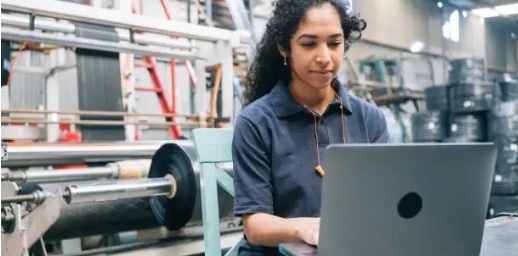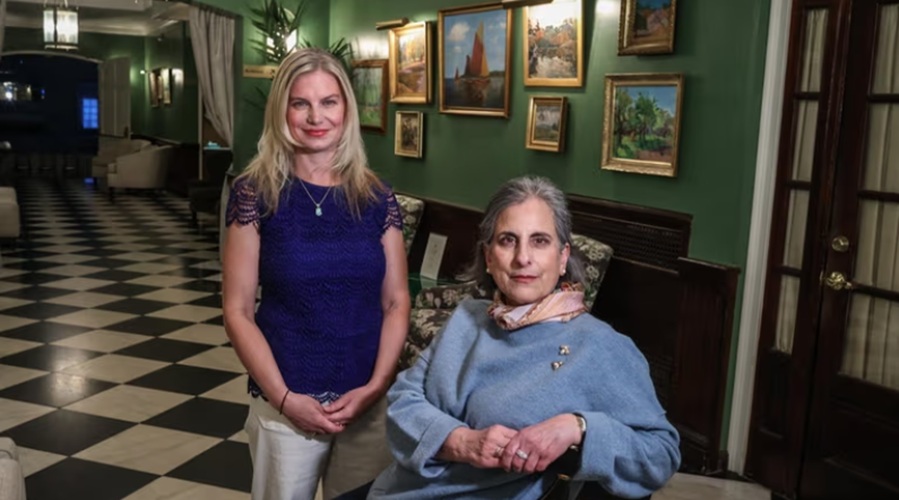Women in Aerospace and Defense Work to Solve Labor Shortage and Diversify Long Island's Manufacturing Sector

Kaycee Martimucci’s grandmother handed her the reins at Nassau Chromium Plating in Mineola five years ago, making her president and a fourth-generation owner at one of the few woman-owned manufacturers in Long Island’s aerospace and defense industry.
But while Martimucci, 40, is bucking one trend, she’s facing another industry-wide challenge: as skilled manual labor retires, there aren’t enough workers drawn to the industry to replace them. More than 35% of the Island's manufacturing workers were 55 or older in 2024, compared with 30.24% in 2014 and 20.4% in 2004, according to the U.S. Census Bureau.
As companies try to build a workforce to meet current and future needs for the U.S. defense industrial base sector, maritime manufacturing and electronic systems, there’s a shortage of machinists — the people making the parts — and engineers — the people designing them.
“For every 20 positions I need filled, there’s only one qualified applicant,” said Martimucci, whose company provides finishing services like powder-coating. “In some cases, like aerospace painting — which is a very specialized skill — companies are so desperate for skilled labor that we’re sharing employees. Someone will work here in the morning and then go to a competitor for the second part of the day. And they can get between $45 and $60 an hour because of their skills.”
WHAT NEWSDAY FOUND
- Women in aerospace and defensemanufacturing on Long Island are working to bring more women into the field to strengthen diversity and address a growing labor shortage.
- Efforts include mentoring, education programs, and networking initiatives, but industry leaders say outdated perceptions and limited exposure to manufacturing careers remain major barriers.
- Changing the face of the workforcewill require sustained outreach, cultural shifts, and clearer pathways to skilled, hands-on roles traditionally dominated by men.
Industry leaders recognize that one way to address the labor shortage is by encouraging women’s participation through education, firsthand trade programs, and targeting young women in high school and college while emphasizing the range of available careers. They are doing so by networking, mentoring and collaborating to support growth and raise awareness about the prevalence of manufacturing on Long Island and the skilled labor it needs to be sustained.
John Spiezio, chairman of Aerospace & Defense Diversification Alliance in Peacetime Transition, whose trade organization, known as ADDAPT, is based at the Cradle of Aviation Museum in Garden City, said that “opening up those opportunities to 50% more of the workforce population is just smart macroeconomics.”
“And since women can be trained to do things equally as well as men, if not better, there’s no micro reason to discourage them from doing any of this work,” Spiezio said.
Fortifying the Industry, Redefining Expectations
In 2023, New York's aerospace and defense industry generated a total economic output of approximately $15 billion, according to the latest numbers from the Aerospace Industries Association. Long Island has a rich history in aviation and defense manufacturing, dating back to World War II. The firms are particularly present in areas like Hauppauge and Bethpage, which is home to a major facility operated by global defense and tech company Northrop Grumman.
But with over 350 small- to mid-sized firms in the region, only about 20 are women-owned, noted Jamie Moore, president of Ignite Long Island, a trade association supporting local manufacturers.
Among the women-led enterprises, a handful have been passed down from family founders to the current owners. These include Martimucci; Teresa Ferraro, 62, who runs East/West Industries in Ronkonkoma; and Anne Shybunko-Moore, 53, owner and CEO of GSE Dynamics in Hauppauge. The rest of the women-owned businesses are start-ups, such as Latour Aerospace, launched by Jessica Latour, 42, in 2009 in Locust Valley to specialize in raw material distribution.
Despite the local defense industrial base sector employing 28,000 Long Island workers, women are only 20% of the workforce Moore, said.
Moore estimated that there are about 950 to 1,000 openings for aerospace and defense manufacturing jobs on Long Island but that as much as 80% of those openings lack "local qualified talent" to choose from, "unless they are poached from other A&D companies, but that still leaves an opening."
“For the vast majority of the jobs that are open we don’t have the people," Moore said. "We have to train them, we have to put educational pieces in place. That’s why we’re working on these large training centers not only to do entry-level training, but to do upskilling and career path training so we can help these companies grow their talent internally.”
While encouraging more women to get into the field could help address the labor shortage, industry leaders acknowledge a need to overcome outdated perceptions that manufacturing is dirty, low-paying work with limited advancement opportunities — a notion that no longer fits the modern landscape.
“We have to do a better job at communicating all the different career pathways that are available, and at the same time, do a better job at marketing and branding the companies that are on Long Island,” said Shybunko-Moore.
Her company, which manufactures structural components for aircraft and submarines, employs 87 people, 21 of whom are women. These women work in management and engineering, including a director of supply chain management who is also a chemist.
Shybunko-Moore emphasized that the role of women should extend beyond office roles to hands-on production where “they’re the ones machining it, drilling it, assembling it, welding it.”
“I definitely do not see women entering into that arena and they should, especially composites technicians, which takes such fine motor skills and really precise effort,” she said.
“We have to do a better job at communicating all the different career pathways that are available.”
— Anne Shybunko-Moore, 53, owner and CEO of GSE Dynamics.
Moore with Ignite Long Island noted that starting salaries for welders average around $79,000, with earnings potentially reaching up to $200,000 with overtime. “And machinists — especially those who can program — that’s a six-figure job,” he added.
The shift to more tech-based manufacturing also means that the work now requires advanced technical training to use methods like 3D printing and computer programs that control mechanical tools, explained Joshua Roff, curator of the Cradle of Aviation Museum.
“It’s not like it used to be with a lathe or a drill gun to make parts,” Roff said. “The workforce needs to be more skilled to handle the new type of manufacturing.”
Martimucci stressed the importance of early education. She called for high school and college programs to better inform students about the variety of careers available, noting the critical need for skills in reading blueprints, quoting accurately, and mastering math, finance, planning, chemistry, manufacturing engineering and metallurgy.
Ferraro, who took over her parents’ business in 1983, leads a company of 88 employees, including 20 women in administrative and engineering roles.
“If you’re good at math, in a manufacturing environment that might make you a really good inspector, because you need to understand the numbers and the dimensions,” she said. “Or if you’re interested in planning and procurement, your skills can be filtered into so many different areas.”
Latour added that women’s organizational and communication skills are vital to meet the high stakes of the industry.
“When a company has an assembly line and an aircraft going down that line, and there’s material that’s not being delivered, they’re losing millions of dollars,” she explained.
A Seat 'At the Table'

Amy Erickson, one of the only female engineers working on microcircuits for satellites in the early 1990s, said she was accustomed to meetings with manufacturing firms in Long Island’s male-dominated aerospace and defense industry where she was the only woman in the room. Yet she was aware of women-owned manufacturers; she had done business with Nassau Chromium Plating when it was owned by Shirley Waring.
At a 2023 meeting for ADDAPT — a trade organization founded in 1991 to advance aerospace and defense manufacturing for companies throughout New York — Erickson noted that over 30 years later, women still weren’t regularly in the room.
“It was very frustrating to me that women still weren’t at the table so they can strengthen their businesses and bring more women into their companies,” she said.
Now sitting on ADDAPT’s board, she has taken steps to change that dynamic.
Encouraged by ADDAPT chairman Spiezio, Erickson launched the Women Leaders in Defense and Aerospace subcommittee in 2023 to raise industry awareness and foster connections among women CEOs, CFOs, general managers and department managers. The initiative also seeks to create pathways for leadership and encourage more women to consider entering the field.
Erickson, who also serves as executive director of the Long Island Manufacturing Extension Partnership based at Stony Brook University, explained that her role is to help small and mid-sized manufacturers grow revenue, retain or create jobs, and optimize processes.
At ADDAPT, she explained, “I focus on a smaller set of manufacturers that supply the aerospace and defense industrial sector, executing the ADDAPT directives. In essence, all these efforts are to help the LI manufacturing community grow and flourish.”
To address talent shortages, several Long Island programs serve as pipelines for future workers. Training initiatives include offerings by the Board of Cooperative Educational Services of Nassau County, the Institute for Workforce Advancement in Melville, and Advanced Manufacturing Training at Suffolk Community College.
Additionally, the Strategic Partnership for Industrial Resurgence at Stony Brook’s Office for Research & Innovation has, over 31 years, completed 4,000 projects with 610 companies by connecting them with undergraduate and graduate students from departments such as applied math, materials science, and engineering.
“Generally, we fill a gap where they may have a project that is not big enough to hire a person with a specific background, but we can provide a student to help them reach that goal,” said director Lisa Chichura.
Business owners like Ferraro and Shybunko-Moore are also driving workforce development.
Ferraro offers internships and collaborates with women’s organizations, such as the Girl Scouts, and local schools to expose students to industry opportunities. Shybunko-Moore is active at Hofstra University’s Fred DeMatteis School of Engineering and Applied Science, helping to attract young women to the field.
Now the incoming chair of the Cradle of Aviation, she also participates in STEM initiatives targeted at females.
“I think what we’re really trying to drive home is the future of aerospace and defense, and how are we attracting the right people. Women are an important part of that mixture,” said Shybunko-Moore, adding that she looks forward to a progressive industry where aerospace and defense remain integral to Long Island.
At a March ADDAPT meeting, where only eight of 35 attendees were women, Linette Lee, president of Jamco Aerospace — a women-owned machine shop in Deer Park — reflected on her challenges as a female Asian-American in the industry.
“It’s good that we have this women’s group now so we can talk,” she said. “We probably should have joined voices years ago; we needed walls to be smashed.”

